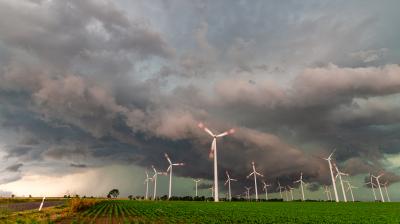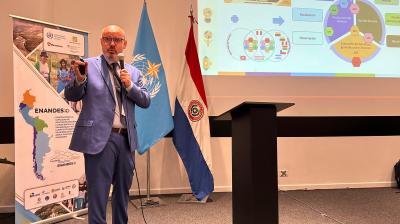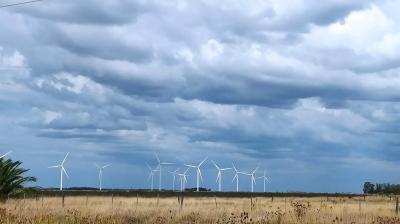Forging a global partnership to support clean energy transition
A new Global Partnership for Weather, Water, and Climate Information and Services for Clean Energy Transition is taking shape. This initiative aims to enhance the integration of hydro-meteorological information and services in the renewable energy sector, supporting the ambitious global goals set in 2023 by the UN Climate Change conference COP28.
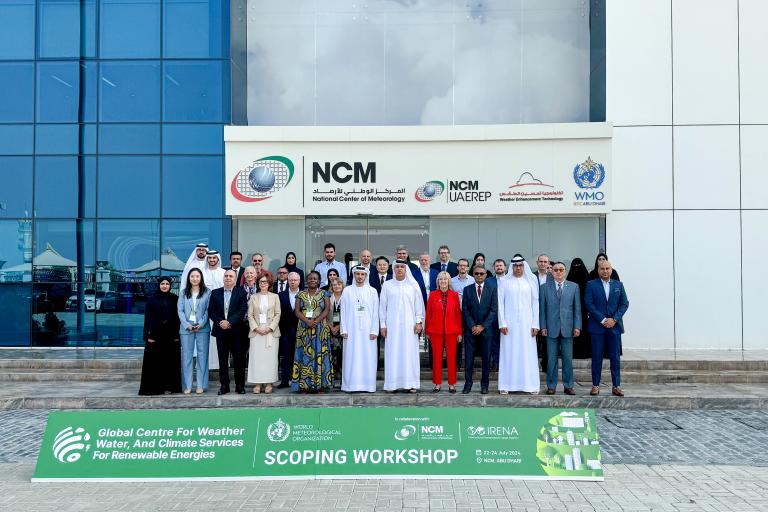
WMO and the International Renewable Energy Agency (IRENA) supported a workshop to lay the foundations for a global centre through global partnership, attended by international experts from energy supply chains and climate-resilient energy systems. It was sponsored and hosted by the National Center of Meteorology (NCM) of the United Arab Emirates (UAE) from 22 – 24 July, in Abu Dhabi, UAE.
Dr. Abdulla Al Mandous, President of WMO and Director General of the NCM, said that a global mechanism, potentially in the form of a global centre, is essential for the provision of comprehensive weather, water, and climate information and services to the energy sector. The UAE is leading global efforts to develop weather, water and climate expertise to secure sustainable clean (renewable) energy for the benefit of future generations, he added.
Mr. Omar Al Yazeedi, Deputy Director General of NCM highlighted the importance of the workshop in his opening remarks. He highlighted that the initiative aims to address a critical gap in supporting the global energy transition, with less than a third of WMO members currently offering such services and also conveyed that the proposed Centre will help optimize renewable energy production, build resilient energy infrastructure, and enhance energy efficiency, ultimately empowering countries to achieve their net zero targets.
Prof. Alberto Troccoli, Director of the World Energy and Meteorology Council and Chair of the WMO Services Commission Study Group on Renewable Energy Transition, said that the scoping workshop for the Global Partnership for Weather, Water, and Climate Information and Services for Clean Energy successfully defined the needs and objectives of the global partnership.
“This partnership will be crucial in supporting enhancement of sector driven Weather, Water, and Climate Information and Services and fostering collaboration among stakeholders to drive the clean energy transition in line with the Paris Agreement,” said Mr Troccoli. “It will facilitate the planning and operation of a reliable, resilient, equitable, and affordable clean energy system.”
Key outcomes of the workshop include plans for producing high-resolution renewable energy atlases, consolidating observational datasets for the energy sector, and strengthening collaborations between National Meteorological and Hydrological Services and energy producers.
WMO is leading efforts to bolster the clean energy transition through advanced meteorological, hydrological, and climate information and services.
COP28 in Dubai (UAE) agreed the UAE Consensus including an unprecedented reference to transitioning away from all fossil fuels in energy systems, in a just, orderly and equitable manner in this critical decade to enable the world to reach net zero emissions by 2050, in keeping with the science, and setting a goal of tripling renewable energy capacity and doubling energy efficiency by 2030, a target aligned with the decarbonization objectives of the 2015 Paris Agreement.
Achieving net-zero emissions by 2050 necessitates a massive shift towards renewable energy sources such as solar, wind, hydropower, geothermal, and marine energy. Given the weather-dependent nature of these renewable sources, the need for sophisticated weather, water, and climate information and services has never been greater.
These services are indispensable for designing, managing, and operating renewable energy systems efficiently and for ensuring their resilience against extreme weather events and the impacts of climate change.
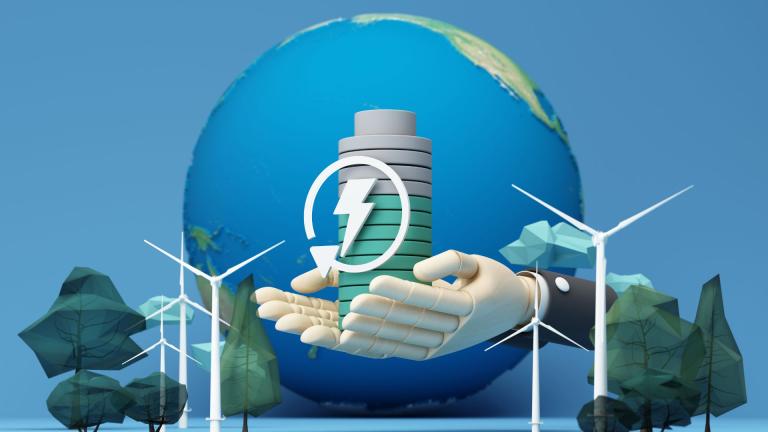
Implementation framework
The workshop outlined four main components essential for the implementation framework of the global centre through a global partnership:
- Science and Innovation: This component emphasizes the importance of developing scientific studies tailored to the renewable energy sector. By fostering innovation, it aims to deepen understanding of the interactions between renewable energy sources and meteorological and climatological dynamics and so support predictive models and tools that can accurately forecast energy production and manage resources effectively.
- Operational Services: Bridging the gap between scientific knowledge and practical application, this component focuses on delivering a comprehensive range of operational services for the renewable energy sector. This includes developing high-resolution atlases of renewable energy production potential, creating weather and climate indices relevant to energy needs, and providing renewable energy yield forecasts. These services are designed to be accessible, understandable, and usable around the clock, ensuring that stakeholders can make informed decisions based on reliable data.
- Capacity Development: Recognizing the critical role of NMHSs in this partnership, this component aims to build and enhance the capacities of these services. Through targeted training courses and workshops, NMHS professionals will gain the knowledge and skills necessary to apply weather, water, and climate data effectively within the renewable energy sector. This training will ensure that NMHSs can provide the operational tools and support needed to drive the clean energy transition.
- Policy and Advocacy: This component underscores the need to translate technical meteorological information into actionable insights for decision-makers and policymakers. By integrating weather, water, and climate services into strategic planning and policy formulation, this component will foster partnerships and collaborations with key stakeholders. It aims to ensure that the renewable energy sector is supported by a robust policy framework that recognizes the critical role of meteorological services.
The partnership will focus on several key functions:
- Integration of energy-related data, products, technologies, and partners to build a global platform that provides essential support to WMO members, with a priority on serving developing countries.
- Learning from the applications of advanced technologies, best practices, and cutting-edge concepts that represent the future of clean energy.
- Promotion of these advanced technologies, practices, and ideas globally, aiming to narrow the technological gap between different countries.
- Innovation in global monitoring and forecasting capabilities essential for renewable energy operations. This involves resource assessment based on historical data, extreme weather monitoring, numerical simulations and climate change scenarios.
- Understanding the demands and challenges of the renewable energy industry by identifying user needs and ensuring that the partnership's services address these needs effectively.
- Promote dialogue and mutual understanding between the meteo-hydrological community and energy sector by organizing cross-industry conferences and training sessions.
- Provide recommendations for energy transition policies and international plans and advice on policies and ambitious international plans that support the renewable energy transition.


